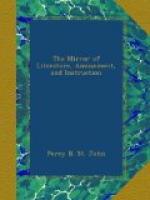The Prussic acid (by some called hydrocyanic acid) is a liquid, extracted from vegetables, and contains one part of cyanogen and one part of hydrogen. It is extracted from the bitter-almond, (as has been stated,) peach-blossom, and the leaves of the laurocerasus. It may also be obtained from animal substances, although a vegetable acid. If lime be added to water, distilled from these substances, a Prussiate of lime is formed; when, if an acid solution of iron be added to this mixture, common Prussian blue (or Prussiate of iron) is precipitated. The acid may be obtained from Prussiate of potash, by making a strong solution of this salt, and then adding as much tartaric acid as will precipitate the potash, when the acid will be left in solution, which must be decanted and distilled.
Its properties are a pungent odour, very much resembling that of bitter-almonds, with a hot but sweetish taste, and extremely volatile. It contains azote, with which no other vegetable acid is combined; it is largely used in the manufacture of Prussian blue. It is the most violent of all poisons, and destroys animals by being applied to the skin only. It is stated by an able chemist, that a single drop applied to the tongue of a mastiff dog caused death so instantaneously, that it appeared to have been destroyed by lightning. One drop to the human frame destroys life in two minutes.
But when chemically combined with other substances, its power is in a great measure neutralized, and it becomes a valuable article, both to the chemist as a test, and to the physician as a medicine. The Prussiate of potash and iron will enable the chemist to discover nearly the whole of the metals when in solution, by the colours its combination produces. Dr. Zollekoffer says, that in intermittent fevers the Prussiate of iron is in its effects superior to Cinchona bark, and says it never disagrees with the stomach, or creates nausea even in the most irritable state, while bark is not unfrequently rejected; a patient will recover from the influence of intermitting and remitting fevers, in the generality of cases, in much less time than is usual in those cases in which bark is employed. S.S.T.
* * * * *
THE ANECDOTE GALLERY.
VOLTAIRE.
(Continued from page 64.)




